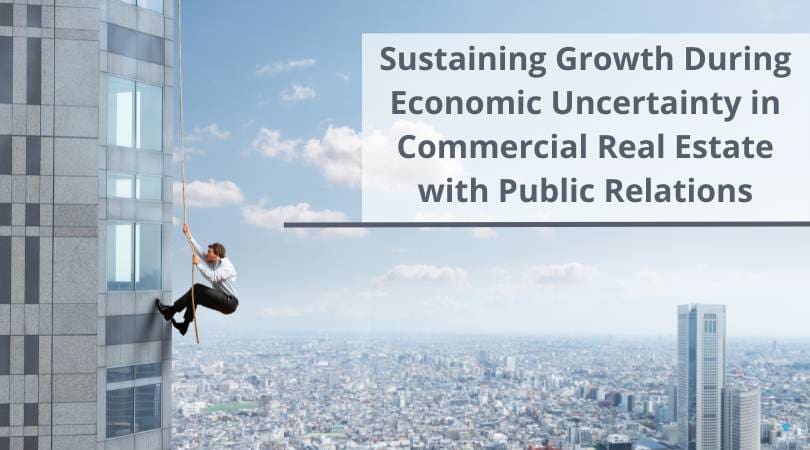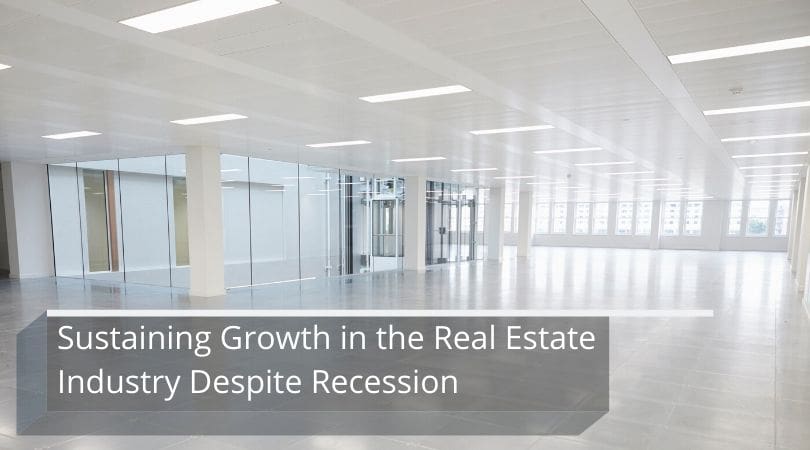As economic conditions improve, companies across sectors find new growth opportunities, and the commercial real estate industry is no exception. Periods of recovery or economic expansion offer a unique chance to realign your brand strategy and maximize opportunities, but they also come with increased competition. Positioning your brand effectively is essential to capturing new business, deepening client relationships, and maintaining a strong market presence.
This article explores top strategies CRE firms can use to position their brand for success when economic conditions are improving. Your firm can thrive in this evolving landscape by staying agile, nurturing relationships, leveraging marketing and data, and focusing on sustainability.
Understanding the shift in economic conditions
There’s a renewed sense of optimism when the economy starts to rebound. However, businesses must recognize that recovery doesn’t happen overnight. It’s a gradual process with shifts in demand, client expectations, and investment behaviors. CRE firms must be prepared to navigate this nuanced environment, as clients may have new priorities and expectations for their real estate decisions.
Improving conditions mean more than returning to pre-recession practices. Relevance requires seizing the moment to innovate, enhancing your offerings, and providing value-driven solutions that address the market’s changing needs.
Focusing on brand agility
Agility is one of the most crucial factors for success in an improving economy. A brand that can quickly pivot and adapt is better positioned to capitalize on new opportunities and mitigate potential risks. In CRE, this means keeping a pulse on market conditions and client needs and being ready to adjust services, marketing, and operations accordingly.
Essential steps for fostering agility:
- Assess market opportunities: Look at new sectors or trends within CRE that could represent growth areas, such as industrial properties, flexible office spaces, or emerging markets in green real estate.
- Diversify services: Offer flexibility by expanding your service portfolio, such as consulting on sustainability or providing technology-driven solutions like smart building management.
- Embrace technology: Digital tools can enhance operational efficiency and improve client experiences. From virtual property tours to AI-driven market analysis, technology helps firms stay agile and responsive to client needs.
- Anticipate disruptions: While the economy may improve, external factors like political changes or environmental disruptions could create volatility. Agility ensures your brand can respond swiftly to these changes.
In an improving economy, brand agility will allow your firm to remain responsive, adaptive, and competitive. Firms that fail to adjust risk being left behind as market conditions shift.
Enhancing client relationships
As markets recover, clients will be looking for more than transactional relationships. They seek trusted advisors who can help them navigate the complexities of a changing economic landscape. Establishing your brand as a thought leader in the CRE space requires fostering long-term, value-driven relationships with your clients.
Imperative actions to enhance client relationships:
- Increase transparency: Offering clients real-time insights and clear communication about market trends, emerging risks, and new opportunities strengthens trust. With so much information available, clients will appreciate transparency in how you assess market conditions and the implications for their investments.
- Offer tailored solutions: One-size-fits-all solutions won’t cut it in a dynamic economy. Take the time to understand each client’s specific needs and challenges and develop customized strategies that provide tangible value.
- Provide proactive communication: Keep clients engaged by regularly sharing updates, personalized reports, and insights that reflect their priorities. This keeps your brand top-of-mind and showcases your firm’s dedication to client success.
Like any business, relationships are critical in CRE, and a client-centric approach is central to thriving during economic recovery. Clients will remember firms that offered them proactive, valuable guidance during times of uncertainty.
Capitalizing on market growth with strategic marketing
As economic conditions improve, the market becomes increasingly competitive. CRE firms need to be proactive in their marketing strategies to stand out from the crowd. A strong marketing strategy will ensure your brand is visible and recognized as a leader in the space.
Consider these marketing strategies:
- Highlight success stories: Showcase recent projects or client success stories demonstrating your firm’s ability to deliver results in an evolving market. Case studies and testimonials are powerful tools for illustrating your expertise.
- Leverage content marketing: Share your knowledge through blogs, white papers, or webinars. This positions your brand as an industry thought leader and provides value to potential clients by offering insights and solutions that address their concerns.
- Boost visibility with PR: Engage in public relations campaigns highlighting your firm’s role in shaping industry developments. Securing media coverage or contributing to industry publications increases your visibility and credibility.
During an economic recovery, marketing requires a proactive approach demonstrating your firm’s value. Companies that effectively highlight their expertise and adaptability are better positioned to capture more market share.
Emphasizing sustainability and ESG goals
In a post-recession environment, sustainability and ESG (Environmental, Social, and Governance) initiatives have become even more critical to investors, tenants, and other stakeholders. Clients increasingly seek to partner with firms that are not only financially sound but also socially responsible. Emphasizing your firm’s commitment to these goals can significantly boost your brand’s appeal.
Key actions to highlight your sustainability efforts:
- Promote green building practices: Demonstrate your expertise in sustainable design, energy efficiency, and renewable energy projects. Highlight your track record in helping clients meet their sustainability goals.
- Showcase ESG initiatives: Whether you’re involved in community engagement, diversity efforts, or environmental conservation projects, communicate your commitment to ESG principles. This can be a powerful differentiator as clients increasingly consider these factors in their decision-making.
- Align your brand message: Make sure your marketing, PR, and client communications consistently reflect your commitment to sustainability. Being recognized as an eco-conscious brand helps attract clients who prioritize long-term sustainability over short-term gains.
With a focus on sustainability and ESG, your firm will capture the attention of forward-thinking clients and position itself as a leader in a rapidly evolving industry.
Leveraging data to anticipate trends
Access to real-time data and market insights is critical for success in an improving economy. CRE firms that leverage data analytics to predict trends and guide decision-making will be better positioned to adapt and thrive. Data-driven decisions give your firm a competitive edge, enabling you to identify opportunities, mitigate risks, and offer clients the insights they need to make informed choices.
Best practices for data-driven success:
- Invest in analytics tools: Use data analytics software to gather and analyze market trends, client behavior, and economic indicators. These tools provide valuable insights to guide your strategy and position your brand for success.
- Share insights with clients: Providing clients with data-driven reports or predictions about future market conditions solidifies your role as a trusted advisor. Clients appreciate access to information that helps them make better decisions.
- Use predictive analytics: Predictive analytics allows you to anticipate trends before they happen. Staying ahead of the curve, your firm can capitalize on new opportunities and maintain a leadership position in the market.
Data is a powerful asset, and firms that use it to their advantage will be better equipped to succeed during periods of economic growth.
Building a foundation for opportunity
Positioning your brand to thrive when economic conditions are improving requires more than resuming business as usual. It involves embracing agility, enhancing client relationships, adopting strategic marketing, prioritizing sustainability, and leveraging data to anticipate future trends. Focusing on these areas enables your firm to seize new opportunities, differentiate itself from the competition, and establish a strong foundation for long-term commercial real estate industry success.


